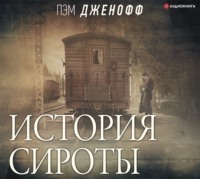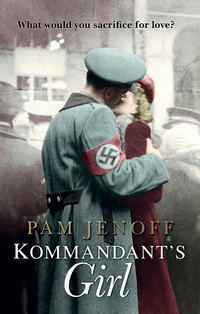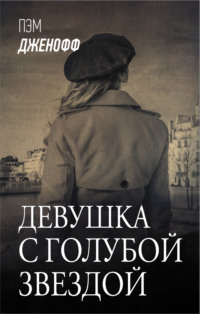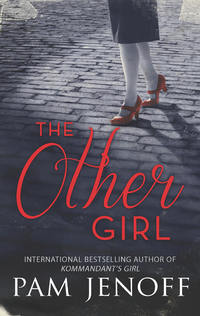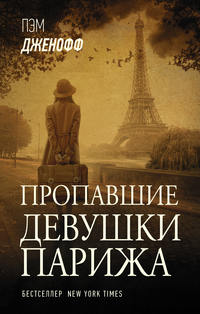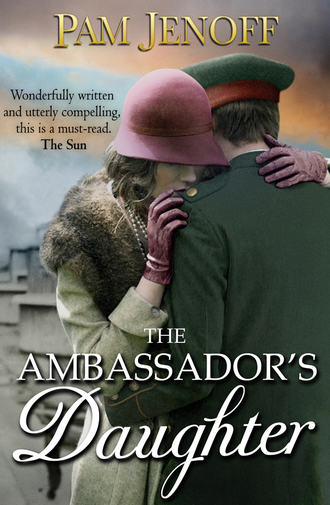
Полная версия
The Ambassador's Daughter
“Wait,” I called after him, standing up. He stopped abruptly, grabbing the handlebar to stop the bike from lurching sideways. “Did you want something?”
He climbed off the bike and set it down at the curb then walked over to me. There was something different about him. Though his strawberry-blond hair and pale skin were the same, he had started shaving, the peach fuzz that had once adorned his upper lip now a faint stubble. He had shot up in height and stood several inches above me and there was a new thickness to his arms.
“I was wondering,” he said, “if you’d like to go to the movies.”
I averted my eyes, caught off guard. I’d expected an invitation to join the football game the boys played Sundays in the park, though Tante Celia said I was getting too old for such things. But his tone was different now and when I turned back to him, I noticed that perspiration soaked his collar. He was nervous.
“Yes,” I say hurriedly, wanting to ease his discomfort.
“I’ll call for you tonight at seven.” He stepped backward, nearly tripping over his bike before getting on and racing away.
The night at the movies was unremarkable, an American comedy, followed by an ice cream at the Eiscafé. After that day, Stefan became increasingly present, coming by the house after school, joining us for Sunday lunch at Uncle Walter’s villa in Grunewald. One afternoon as we strolled around the lake behind the villa, I looked down at our hands, fingers intertwined, and realized that we were courting. Not that it was so very different from when we had just been friends. Stefan was unobtrusive and left me to my own devices. Being with him was rather like being with myself.
We were at Uncle Walter’s for Sunday lunch when news of the war came. One of his aides rushed into the dining room and whispered in his ear and he broke the usual quiet by turning on the radio that sat on the mantelpiece. The men nodded with approval as Germany’s declaration of war crackled over the airwaves. Our ally Austria’s Archduke Franz Ferdinand had been assassinated, murdered in broad daylight by a heathen Serb. We had to take a stand.
Ten minutes later, I climb from the tub, still thinking of Stefan as I dry and put on a fresh dress. I could have gone back to Berlin after the war, insisted that Papa allow me to be with Stefan as he recovers. But I had not. I swallow against my guilt. He is well cared for by his family. It is me he wants above all else, though, I can tell from his letters, which always speak excitedly of my return. I have sent packages of French jellies and other delicacies, but answering his letters is harder. What can I say to this man I hardly know anymore?
I rummage through my toiletries for some salve to relieve my hands, which have grown dry and chapped from the air here. It is my insistence on taking off my gloves too often, Tante Celia says. The items in my kit are few—some face powder, a single tube of pale pink lipstick for special occasions, a fragrance that Celia had given me for my birthday last year, too flowery for my taste.
By the time I emerge, Papa has returned, shuffling papers at the rolltop desk in the corner that doubles as his study over a glass of Pernod. Dinner, two plates covered by metal domes and a thick loaf of bread wrapped in cloth, sits un-served as is our preference.
“Papa,” I say gently, nudging him from his work. I bring the candlesticks down from the mantelpiece as he pours the wine. “Baruch atah Adonai …”
“Celia is at a reception,” he says without my asking when we’ve finished the blessings. I exhale slightly. I would not have been uncharitable and turned away kin with nowhere to go. But spending each Sabbath together is a tradition that Papa and I have observed wherever we have been in the world, bringing our silver Kiddush cup and candlesticks with us, and we continue it here in Paris. No matter how busy he is, Papa always stops what he is doing so that we can have a meal and talk, just the two of us.
I cut the crusty, still-warm loaf of bread. Living in the hotel, it is easy to forget about the shortages the outside world still endures. I hand Papa a piece and notice then that his face is pale. Though he is immaculately dressed and groomed as always, a trim sliver of silver hair circling his head, there are dark circles around his eyes. “Have you taken your medicine?” I ask gently. He gets so caught up in his work that he can forget to eat or sleep much less to take the pills that the doctor said are important for his heart condition. I’ve been reminding him for as long as I can remember.
Before he can answer, I sneeze once, then again. “It’s the dry air,” I say hastily, reaching for my handkerchief. Papa’s brow wrinkles with consternation, now his turn to worry about me. Spanish flu, like the one that had taken my mother more than a decade ago, has been on the rise since autumn. Though I had also come down with the flu as a child, it had spared me like the angel of death in the Passover story, passing by as if lamb’s blood had been painted on the door. I had labored with a fever for days. Then I’d awakened with a permanent crescent-shaped scar on my neck, a reaction to one of the medicines.
But this new flu strain is even more virulent, having taken twelve lives at Oxford alone before our departure. People talked endlessly about how to prevent it—wash out the nose with warm water and soda, wear garlic around the neck, drink a shot of whiskey before bedtime. Some whispered that the Germans unleashed it as a weapon of war, stopping just short of blaming me and Papa personally. “More likely,” Papa said once, “it came across the Atlantic with the soldiers.” In London, people had all but stopped going out. But here the parties continue on gaily, as if germs were some invention of the science fiction writers.
I sample a spoonful of the rich coq au vin. “I’m fine, really. Tell me about your day.”
As we eat, Papa describes his meeting with the men from the Italian delegation, who are seeking his support for an independent Macedonia. “And then there are the West African colonies,” he says, jumping topics as always with mercurial speed. “The French are going to put up a fight on granting independence. They want mandates instead.”
“So it is only to be self-determination for some.”
“Liebchen, we must be practical. One cannot change the entire world in just a few months.”
Then what is the point of the conference? I wonder. “We have to work within the system,” he adds, as if responding to my unspoken question. “Though I know you do not agree. Enough about my work,” he says, as I clear the plates and set out coffee and apple cake. “How are you, my dear?”
“Fine. A bit restless.”
“Oh? I thought you and Celia might enjoy some of the museums….” His voice trails off and he winces at the gulf between me and mother’s sister, a woman he dearly wishes I would accept. “Perhaps if you had a brother or sister,” he frets, as he has so many times over the years. Small families like ours are the exception rather than the rule but, for some reason not quite clear to me, siblings had not been possible.
I kiss his cheek. “I would not have cared to share you,” I say, trying to assuage his guilt. It is the truth. The two of us have always been enough. I see then our Sabbath meals as a tableau, a scene that has played itself out in various cities over the years. “And I’m fine, really. The parties are all well and good, but the women are just silly.” I stop, hearing myself complaining again.
“Would you be happier outside the city?” Papa asks.
I contemplate the question. I have always felt freest when close to nature, like on the hiking trips we took when I was a child. Papa, despite being bookish, had an amazing capacity for the outdoors, an ability to navigate the densest forest without a compass, to find fresh water and sense the weather that was coming. We would climb high with a day’s food in our packs and stay in the cabins that populated the high hills, reaching the next before sundown.
But Paris, while cramped, has a certain energy. And I don’t want to be exiled to some boring suburb with Tante Celia. “I don’t know. I don’t think so, anyway.”
It isn’t the city itself that I dislike, I decide as we eat dessert. I came here every spring as a child, shopping the fine boutiques of Faubourg Saint-Honoré with my mother until Papa joined us at the end of the day for cakes at one of the patisseries. I’d even dreamed of one day studying at the Sorbonne.
No, it’s Paris now that I hate. On the eve of the conference, the city is bursting at the seams with journalists and delegates from every conceivable cause and country. Hotels empty since before the war have been aired out, their rooms hastily refreshed to accommodate everyone who has come to the show. I don’t mind those who have cause to be here, the stuffy clusters of suited men who will decide the future of the world, the scrappy delegates from countries seeking to be born. But the hangers-on, the socialites and doyennes that have come to provide the parties and other window dressing, having stifled Paris to the choking point.
“Well, the question will be out of our hands at some point. When the Germans arrive,” he says. My brow wrinkles. We are the Germans. “The official delegation, I mean, we’ll be expected to go out to Versailles where they are to be housed.”
I consider this new bit of information. The conference proceedings are being held in Paris, but the Germans will be housed outside in Versailles. The site where the Germans had imposed their draconian peace terms on France a half-century earlier, it is now where we are to get our just deserts. “Are the conference proceedings to move out there when the delegation arrives?”
“Not that I’m aware.”
“But one would think, if the Germans are to participate in the conference that they should be near the meetings….”
“One would think.” He pauses for a sip of coffee. “One would think that they would have invited the German delegation here for the early months of the conference if they were really to participate.”
How could one negotiate peace without the other side at the table? “Are you familiar with the delegation?” I ask.
“Oh, the usual sorts. Rantzau—he’s the new foreign minister—as well as the defense minister and the ambassador, of course, Uncle Walter’s old nemesis.” The men in power form a very tight club, raised in the same circles and educated at the same schools. It was a club to which Papa had never wanted to belong, but now he had found himself drawn back in by the conference. “There’s a younger fellow, too, a military captain, but I can’t recall his name.”
“Are they bringing anyone with them? Families, I mean?”
Papa shakes his head. “Hotel accommodations are quite limited in Versailles.” It was unusual for delegates, even from the victorious countries, to bring their wives and children. “You still haven’t told me what you’ve been up to today, other than avoiding Tante Celia.”
I consider mentioning the woman in the blue cape, but even in my head it sounds inconsequential, my own interest silly. “I saw Wilson’s arrival today,” I say instead.
“Oh?”
“The crowd was most receptive.”
“They have such high hopes. The Fourteen Points, self-determination, a new world order …” He shakes his head. “Wilson is idealistic. It’s like the notion in Judaism—tikun olam means, quite literally, to repair the world. That’s what he is trying to do.”
“You don’t think he will be able to do it.”
“I think it isn’t that simple.” He picks up his pipe, but does not light it, instead waving it like a pointer in a lecture hall. “Take self-determination for example. What does that mean? Who is the self—a nationality, a religious group or something altogether different?” He jabs at the air in front of him. “Do I believe they will make a difference or reshape the world? I don’t know. The world will never go back to what it was—kaisers and czars and kings, but the question is whether we can make something better in its place. I believe the world will be a better place for the trying.” He sighs. “Anyway, you’ll get to see a bit more of Wilson at the welcoming reception tomorrow night.” I cock my head. “I mentioned it to you last week.” The social calendar had been so full with stuffy affairs, I’d stopped listening, rather allowing Papa and Celia to lead me where needed. “It should be quite the occasion.”
I groan. “Must I attend?”
“I’m afraid so. It is an important event and it wouldn’t do for us to miss it. You’ve heard from Stefan?” he asks, changing the subject again. Papa has allowed me much liberty as a young woman, but on this one point he pushes. He is nearly seventy now, and eager to see me settled, rather than left alone in the world.
“I have.” I do not admit that I’ve not opened today’s letter, instead focusing on things that Stefan wrote last week. “They’ve apparently got a good deal of snow in Berlin, much more so than here.”
He nods. “Uncle Walter said the same. I’m sure you are eager to return to him. Stefan that is, not Uncle Walter.” I smile at this. My mother’s brother has never been a favorite of mine. “How is he?” Papa asks, an unmistakable note of fondness to his voice. Papa always liked Stefan—their gentle personalities were well suited to each other. Stefan did not share Papa’s razor-sharp intellect, but he always listened with rapt attention to Papa talk about the latest article he was writing.
“He’s working very hard at rehabilitation. He’s even managed to stand up a few times.”
“That’s remarkable. He wasn’t expected to live, so to get out of a chair is really something. Perhaps he’ll even get around with a walker someday. What an extraordinary young man.”
A pang of jealousy shoots through me. In some ways, Stefan is the son Papa never had. Not that Stefan could follow Papa into academia. The Osters were a once well-to-do banking family that had fallen on hard times. Stefan, as the oldest of four children and the only son, has been expected to somehow restore the family to a better station. We had hoped that he might join Uncle Walter and run one of the plants. But imagining him trying to navigate around the heavy machinery of the factory floor with a walker seems quite impossible now.
“He is doing really well,” I say, but something nags at me. “Do you think he is damaged, beyond his legs, I mean? His letters just feel a little off.” Papa wrinkles his brow, as if asking me to say more. But I can’t quite articulate my concern.
“It’s the war, darling. Give him time.” I nod. Stefan is such a good man. My heart breaks for the things he has seen and suffered. I cannot help but wonder, though, whether he will ever be whole again.
“Hopefully the conference will move quickly and we can return to Berlin soon so you can see him.”
I swallow over the lump that has formed in my throat. “Hopefully.”
“Good night, dear.” He walks to the desk and reaches for a stack of papers. Despite his slight size and quiet demeanor, Papa has always been the strongest man I’ve known. Not just strong: brave. Once when I was about six we’d been walking our German shepherd, Gunther, through the Tiergarten when a large stray confronted us, blocking the path ahead. My first instinct had been to leap back in fear. But Papa moved forward placing himself between gentle Gunther and the snarling beast. In that moment, I understood what it took to be a parent, in a way I might never quite be able to manage myself.
He has given up so much to raise me. After Mother died, it would have been logical for him to leave my upbringing to Tante Celia or governesses. But instead he had cut short his schedule at the university, declining to teach in the late afternoon and evening, and taking his work home so he could read alongside me. He had made me a part of his journeys and declined the opportunities where he could not because the destinations were too far-flung or the travel unsafe or good schools not available. There were times, I could tell, that conversation was too much and he was eager to escape into his work from the harshness of everyday life and the pain that he carried. He made sure, though, that I was never alone.
But now, hunched over the desk, he appears vulnerable. I am seized with the urge to reach down and hug him. Instead, I place a hand on his shoulder. He looks up, startled by my unexpected touch. We have never been very physically affectionate. “Good night, Papa.”
I return the dinner tray to the hall, then carry the lamp to my room so that Papa can work in the sitting room uninterrupted. I pull out the volume of Goethe I’d purchased from the bookseller and run my hand over the cover. Stefan would love it—or would have, once upon a time. We had always shared a deep passion for books and our families were frequently amused to find us sitting together under a tree in the garden or in the parlor, reading silently side by side, each lost in our own world. But is he even reading now? And would the book, with its references to death and suffering, just make things worse for him? I set it down on the table.
Stefan’s letter sits on the dresser. Reluctantly I open it.
Dearest Margot—
I can tell from the almost illegible script that he has tried to write himself this time instead of having the nurse do it.
I hope that this letter finds you well. Exciting news: Father is modifying the cottage and building an extension for us so we can live there after the wedding.
I cringe. Stefan is immobilized in a wheelchair—of course he cannot return to the Berlin town house with its many narrow stairs. I recall the Osters’ vacation cottage, a two-room house on the edge of a maudlin lake, more than an hour from the city. Are we really to live in the middle of nowhere? How will he earn a living?
I finger the ring that Stefan gave me before leaving for the front. I should have gone to be with him, a voice inside me nags for the hundredth time. I had good reasons for not going—first the war and later the railway lines and now Papa being summoned to Paris. There were ways I might have gone, though, if I pushed hard enough. But I hadn’t, instead embracing the excuses like a mantle, shielding myself from the truth that inevitably awaits. I slip the ring from my finger and put it in my pocket.
I fold the letter and put it back into the envelope without reading further.
A scrap of paper falls from the envelope and flutters to the floor. A photograph. I pick it up, wishing he had not sent it. He meant it as a good thing, sitting up in the wheelchair and smiling as if to say, Look how far I’ve come. In some ways it is better than the man I see in my nightmares, but his face is a stranger’s to me, the hollow eyes confirming everything I fear about our future together.
Perhaps being in Paris is not the worst thing, after all.
2
As we ascend the marble staircase to the ballroom at the Hôtel de Crillon, my impression is one of white—wreaths of lilies and roses climbing the columns, great swaths of snowy tulle draped from the balconies above. “I’ll just be a moment,” Papa says, heading in the direction of the cloakroom with our coats. I take the glass of wine that is offered to me by one of the servers, then step out of the flow of the crowd. The reception is like all of the other parties we have attended since coming to Paris, only magnified tenfold, the pond of gray-haired men in black tuxedos now a sea. A handful of women in expensive gowns, the deep maroon and dusky-rose shades that are the fashion this year, cling to the periphery. The savory smell of the hors d’oeuvres mixes with a cacophony of floral perfumes and cigarette smoke.
The orchestra at the front of the room breaks from the waltz it had been playing midstanza and bursts into a robust rendition of “The Star-Spangled Banner.” The guests hush, turning expectantly toward the entrance and there is a low murmur as President and Mrs. Wilson enter. The crowd parts to let them through. Closer now, he is taller than I thought, with a grimly set jaw.
A man I recognize from other occasions as the American ambassador, Stan Stahl, steps forward to greet the Wilsons. But before he can reach them, an Oriental boy, no older than myself, cuts in front of him and approaches the president. The boy, who wears not the uniform of a formal server but the white shirt and apron of the kitchen staff, holds an envelope outstretched in his shaking hand. An audible gasp runs through the ballroom.
One of the guards flanking Wilson moves to place himself between the president and the boy, but Wilson shakes him off. “He means no harm.” Wilson takes the letter and opens it. “Thank you,” he says, as solemnly as though he is speaking with one of the other Allied leaders. Apparently satisfied, the kitchen boy bows, then turns and disappears through one of the servers’ doors. Yelling can be heard from the other side.
What does the letter say, I wonder. The spectacle over, the crowd closes in to greet the Wilsons. I scan the room for Papa and find him in the corner, shanghaied by someone, undoubtedly a delegate wanting to secure his support for a resolution. Now that the conference is about to begin in earnest, those lobbying for certain issues have dropped all pretense of subtlety, haranguing Papa and others in positions of influence nonstop for their support. I don’t mind his being delayed—it is easier to be anonymous on my own, to slip back among the draperies and observe rather than participate. I only hope he will be able to extricate himself at some point. My curiosity at seeing Wilson satisfied, I am eager to escape back to the hotel, out of this starchy gown that Tante Celia selected for me and back to the novel I’d been reading.
The orchestra begins playing a waltz. Watching couples swirl around the floor, a memory flashes through my mind of a night not long after Stefan and I had started courting when he had come to the house to escort me to a school dance. He had arrived too early and as I brushed my hair I could hear him talking with Papa in the parlor below, their conversation somehow more awkward than usual. I came downstairs a few minutes later and Stefan’s eyes widened at the sight of me in my pink party dress. His hair was freshly trimmed and he wore a crisp white shirt I had not seen before.
“Here.” He held out a small corsage. As he helped me pin it on awkwardly, I smelled the aftershave he had surely borrowed from his father. We did not speak on the short ride to school. Everything was more formal, the way he held doors for me and helped me from the car, and I disliked the stiffness that interfered with our usual easy company. The school cafeteria had been decorated with crepe paper and vases of fresh wildflowers that could not quite mask the lingering smell of sauerkraut and wurst lunches that had worn its way into the cinder-block walls over the years.
As I see Stefan’s face in my mind, an unexpected flash of tenderness wells up inside me. He cared for me in a way that no one ever had except Papa—and I liked that. Before him, my world had always been solitary, with my mother gone and Papa ensconced in his work. Stefan’s near-constant presence made me feel somehow less alone. But I am longing for the boy I left four years ago. Even if I returned to Berlin this minute, things would be different.
My foot throbs, reminding me of the cracked dress shoe that I’ve neglected for months to replace. I duck into one of the side salons off the main ballroom, where a handful of people cluster around small tables with tiny white candles at the center, and sink into an empty chair by a potted fern. In the far corner, an older woman sits at a piano, head bowed, eyes closed as she plays.
When the pianist lifts her head I gasp slightly. She is the woman in blue who fled Wilson’s arrival, the one I’d followed from the square. That is why she looked familiar—I have seen her playing at a handful of the other gatherings since we arrived. I stand and start toward the piano. She is not beautiful, I decide instantly. The bridge of her nose is curved and her eyes set close, giving her a hawkish appearance. But her cheekbones are high and her hair upswept, making the harsh somehow regal.




